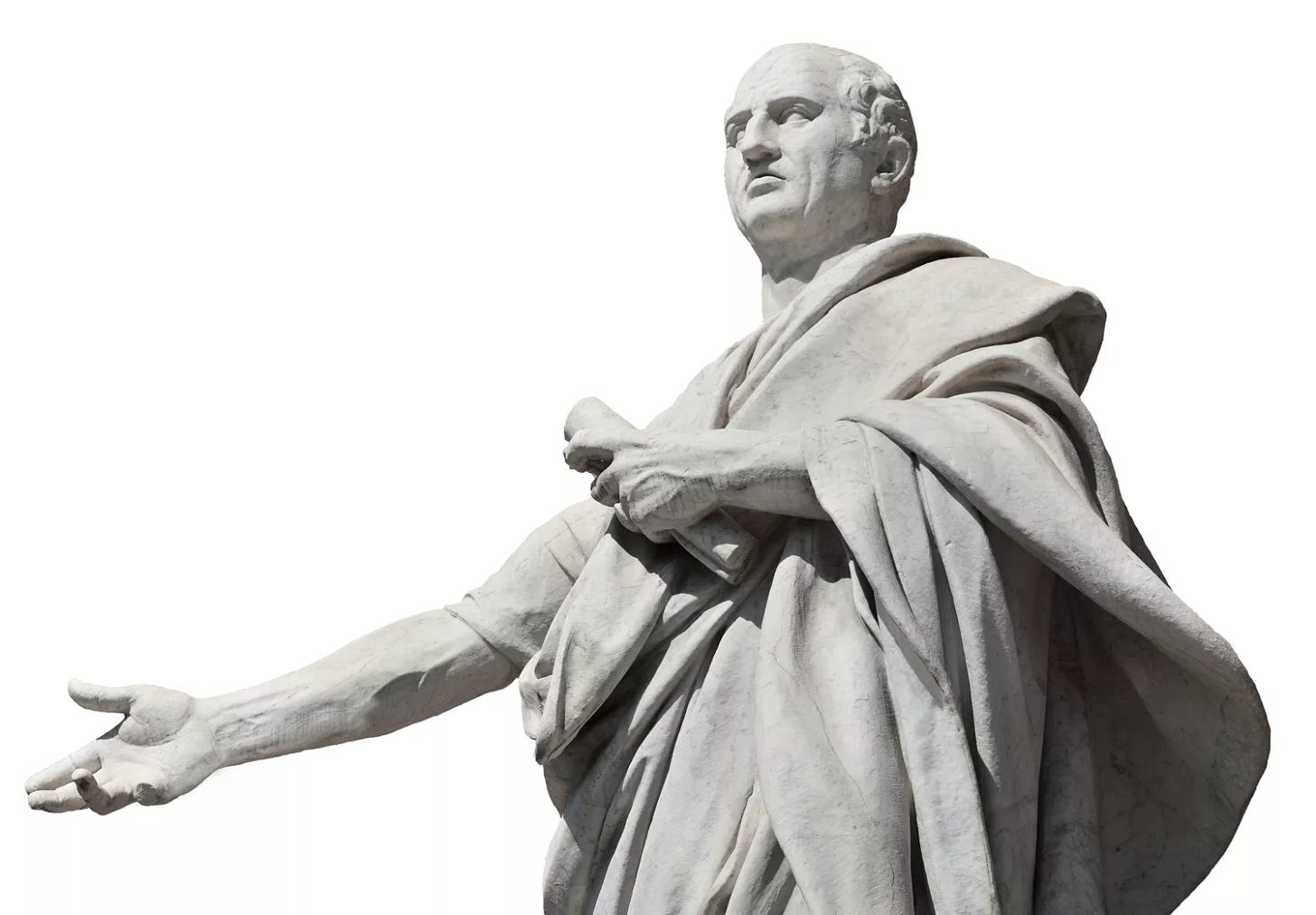Rome’s greatest orator, lawyer and political thinker, Cicero was exceptional amongst the generals, consuls and warlords of the late Roman Republic in never having been a soldier. He was, however, a fluent writer on subjects from astronomy to philosophy. Although his suppression of Catiline’s conspiracy led to many citizens’ arguably illegal deaths, he was a civilian and a man of peace in an age of civil wars and naked military ambition. As his 800 surviving letters reveal, he was a man of genuine goodwill and optimism - over-optimism, as it turned out. Cicero attempted to apply Greek philosophy’s ethical findings to Roman politics and human behaviour in general. Through Cicero’s writings, much of Greek culture was transmitted to western Europe.
Marcus Tullius Cicero was born in 106 BC in the small town of Arpinum, 100km (60 miles) south of Rome to an equestrian family. None of his ancestors had held office in Rome, so his rise to the consulship made him a novus homo, a ‘new’ or self-made man. He depended on his skills as a lawyer and orator but luckily won the friendship and support of Atticus, a rich banker. Cicero started his legal career by appearing in court against one of Sulla’s freedmen in 81 BC, risking the dictator’s wrath. Wisely, he withdrew to Athens to continue his study of philosophy. He accepted the ethical precepts of Stoicism that hall human beings had a spark of the divine in them.
Returning to Rome after Sulla’s death, Cicero was elected quaestor in 75 BC. The Sicilians fighting him asked him to prosecute Verres, an ex-governor of the island, for extortion in 70 BC. Cicero’s speeches were so devastatingly effective, driving Verres into exile, that the grateful Sicilians showered presents on him. He distributed these to needy citizens. Cicero became a praetor in 66 BC, dealing with legal cases ‘fairly and honestly’, as Plutarch put it. He also advised Pompey, then assuming his high command. Finally, in 63 BC, he was elected consul, the highest office.
Cicero owed his meteoric rise, unsupported by any great noble house, chiefly to his mastery of rhetoric — dramatic, impassioned public speaking, a key art of ancient civilisation. Brilliant at ridiculing opponents, he used wit, irony and innuendo to overwhelm and seduce listeners. He also embodied the aspirations of the rising commercial equestrian class. Realising that the senatorial class was too narrow, Cicero envisaged a concordia ordinum, a concord of the classes between senate and equestrians, which he later widened to consensus omnium bonorum, a consensus of all good men. He regarded himself as a saviour of the Republic by his swift if brutal suppression of the conspiracy by the disgruntled patrician Catiline, who tried to overthrow the state in October 63 BC.
Unfortunately, Cicero failed to win over one man with the military power to support his concordia. Pompey returned in triumph from his eastern conquests to be snubbed by the Senate. On meeting him, Cicero talked only of his own achievements, annoying Pompey. In 58 BC, Cicero was forced into retirement, accused of acting illegally over that Catiline affair. Although recalled by Pompey, his political influence never fully recovered and he had to write the co-triumvir Caesar a grovelling letter promising he would not attack him again.
The Writer
Cicero’s enforced leisure gave him time to write. His letters, mostly to Atticus his banker friend, reveal an urbane and cultured upper-class Roman, fond of dinner parties and literary discussions. His letter describing the visit of Caesar to his villa near Puteoli is a masterpiece.
‘What a guest! Two thousand troops in all… The villa was sealed off. But it went off all right. He was in a good mood and all the talk at the table was of literature. Political subjects were avoided altogether. But once is definitely enough.’
Cicero was also a family man. His son Marcus was clearly a problem, getting through a vast allowance in Athens. Cicero reserved his greatest love for his daughter Tullia, whose death in childbirth desolated him. He tried to console himself with a belief in the immortality of the soul, but was not totally convinced.
Cicero wrote copiously on philosophy and politics — not original stuff, ‘only the exact words are mine’. The Laws, The Offices and The Republic deal with the politics and the constitution, whilst De Finibus (The Highest Ends) summarises much of Greek philosophy. After Caesar’s death in 44 BC, in which he had no part, Cicero persuaded the Senate to appoint young Octavian to lead an army against Mark Antony. This was a mistake. Octavian, forming the Second Triumvirate, added Cicero’s name to the list of those to be proscribed (killed), realising that Cicero represented the Republic’s last best hope. Cicero had set out on a journey to join the conspirators in Greece when Octavian’s men overtook him and cut his throat. His severed head and hands were later exhibited in the Forum.




